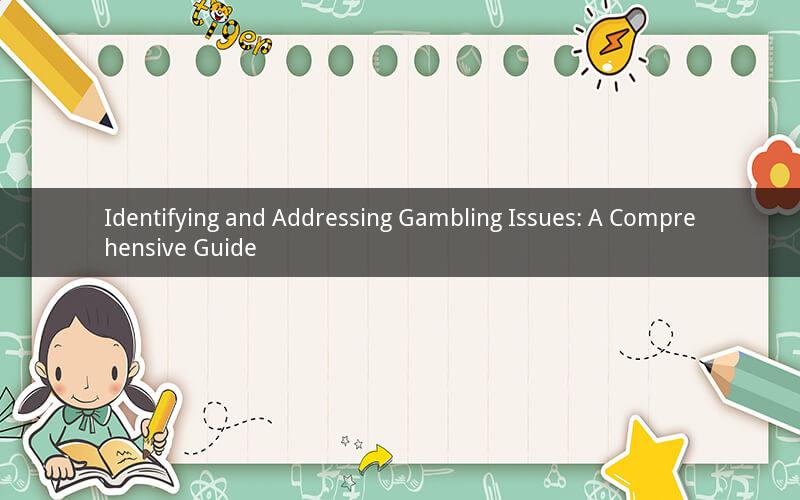
Introduction:
Gambling can be an entertaining and thrilling activity, but it can also lead to serious problems if not approached responsibly. If you are wondering how to determine if you have a gambling problem, this article will provide you with a comprehensive guide to help you understand the signs and symptoms, seek help, and take steps towards recovery.
1. Understanding the Basics of Gambling
Before delving into the identification of a gambling problem, it is essential to have a clear understanding of what gambling entails. Gambling involves risking money or valuable items on the outcome of an event that is determined by chance. Common forms of gambling include casinos, sports betting, lottery, poker, and online gaming.
2. Signs and Symptoms of a Gambling Problem
Recognizing the signs and symptoms of a gambling problem is crucial in taking the first step towards overcoming it. Here are some common indicators:
a) Preoccupation: Spending a significant amount of time thinking about gambling, planning how to gamble, or recovering from a gambling session.
b) Loss of Control: Inability to stop gambling, even when facing negative consequences such as financial problems, strained relationships, or health issues.
c) Compulsive Behavior: Engaging in gambling activities despite the knowledge that it is causing harm to oneself or others.
d) Emotional Distress: Experiencing mood swings, anxiety, depression, or other emotional difficulties as a result of gambling.
e) Lying or Hiding: Deceiving loved ones or hiding gambling activities to avoid judgment or consequences.
f) Financial Consequences: Accumulating debt, selling personal belongings, or experiencing financial difficulties due to gambling.
3. Seeking Professional Help
If you suspect that you or someone you know has a gambling problem, it is crucial to seek professional help. Here are some options for obtaining support:
a) Therapists: Finding a therapist specializing in gambling addiction can provide personalized treatment and support. Therapy can help address underlying issues and develop coping strategies.
b) Gamblers Anonymous: This self-help group offers support and resources for individuals struggling with gambling addiction. Meetings are available in many locations worldwide.
c) Support Groups: Joining a support group, such as Gam-Anon (for family and friends of gamblers), can provide a sense of community and understanding.
d) Hotlines and Online Resources: Utilizing helplines and online resources can provide immediate assistance and guidance for individuals struggling with gambling issues.
4. Taking Steps Towards Recovery
Recovery from a gambling problem is a gradual process that requires commitment and determination. Here are some strategies to help you on your journey:
a) Set Clear Boundaries: Establishing clear limits on how much time and money you spend on gambling can prevent relapse and help you maintain control.
b) Develop Healthy Coping Mechanisms: Engaging in healthy activities such as exercise, hobbies, or socializing can provide alternatives to gambling and reduce the urge to gamble.
c) Strengthen Support Systems: Surround yourself with individuals who support your recovery journey and can offer encouragement and guidance.
d) Create a Financial Plan: Addressing financial consequences is essential for recovery. Seek advice from a financial advisor or credit counselor to develop a plan to manage debt and improve financial stability.
5. Questions and Answers
Q1: Can a person with a gambling problem recover?
A1: Yes, recovery from a gambling problem is possible. With proper support, treatment, and commitment, individuals can overcome their addiction and lead a fulfilling life.
Q2: Is it normal to feel guilty or ashamed about having a gambling problem?
A2: It is natural to experience feelings of guilt or shame when struggling with a gambling problem. However, seeking help and taking steps towards recovery is a sign of strength, not weakness.
Q3: How can I convince a loved one to seek help for their gambling problem?
A3: Encourage your loved one to seek help by expressing your concerns, offering support, and suggesting professional resources. It is important to approach the conversation with empathy and understanding.
Q4: Can therapy alone help someone recover from a gambling problem?
A4: Therapy can be an effective component of recovery, but it is often most beneficial when combined with other strategies such as support groups, financial counseling, and lifestyle changes.
Q5: Is there a cure for gambling addiction?
A5: There is no definitive cure for gambling addiction, but recovery is possible. Treatment and ongoing support can help individuals manage their addiction and lead a healthier, more fulfilling life.
Conclusion:
Identifying and addressing a gambling problem is a critical step towards a healthier and more balanced life. By understanding the signs and symptoms, seeking professional help, and taking proactive steps towards recovery, individuals can overcome their addiction and reclaim their lives. Remember, help is available, and there is hope for a brighter future.